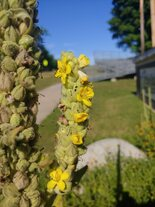
The Beal experiment is the oldest ongoing science experiment in the world. In 1879, Dr. William Beal buried 20 open jars, each containing 50 seeds from 21 weed species on the MSU campus. He wondered how long it would take for the buried seeds to die, and planned for a century-long experiment. After the first 5 years, some species, like white clover, were already dead! Now bottles are checked every 20 years – in April 2021, the 16th bottle was dug up. All the species but one had died during those 141 years. That species, Verbascum blattaria, had 20 of the 50 seeds germinate and grow into normal plants! Four bottles remain, and the next will come out in 2041.

WALII’s Grace (Margaret) Fleming is the scientist at MSU continuing Beal’s experiment. Dr. Fleming is also designing a follow-up experiment: she wonders whether seeds buried in different soils take the same amount of time to die. To get seeds placed in different soil types, we need help from people around the country who are willing to bury seeds in their soil and check on them from time to time. We will supply seeds and instructions – you supply the hole.
How to Join the Project: This project will begin in the Fall of 2023, and participants can join now at citsci.org. Please click here or the button above to be taken to our project (Seed Burial Experiment) site on citsci.org. Once you create a free citsci account and log in, you will be able to join our project (and all other citsci projects). We will contact all project members by September 1, 2024 to distribute instructions for burying seeds and collecting data, and to coordinate the first supply shipment (available for free on request). All participants who submit data will be acknowledged in publications resulting from this community science project!


